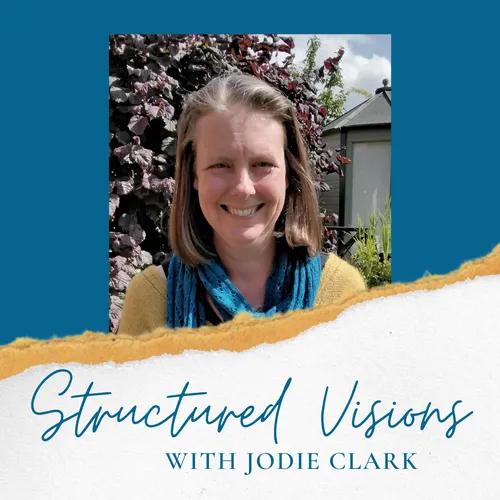
Structured Visions
Linguist Jodie Clark explores creative ways of imagining social transformation.
- Update frequency
- every 20 days
- Average duration
- 39 minutes
- Episodes
- 115
- Years Active
- 2015 - 2025

Episode 94 Language and the afterlife
What happens when we die? Ideas about the afterlife (or the lack of an afterlife) requires theory building based on either faith or experience. What if you don’t have faith in stories about the after…

Episode 93 Where do you stop and the rest of the world begin?
Is there a distinction between you and the rest of the world?
Where do you stop and the rest of the world begin?
What’s the meaning of the word ‘now’?
The gift of language is that it shapes and resha…

Episode 92 The grammatical shape of emotions
When was the last time you lost language? And… how do you feel? The one time it feels like I’m losing language is when I let myself feel what I really feel. (We’re talking about weeping, wailing, kee…

Episode 91 The limits of language and selfhood
Linguistic interaction involves much more than simply sharing information. It requires shaping the information so that it will fit in to a pre-existing structure. This is where we might run into prob…

Episode 90 Language, intimacy and narcissism
What’s the worst relationship you’ve ever been in?
What’s the difference between this and that?
There are at least three ways of understanding that second question, each of which reveals a different …

Episode 89 Grammar as a gateway to mystery
‘Dreams, it turns out, are like clauses. They can be configured and reconfigured in an infinite number of ways. They are quanta of information about what could be transformed in the world, whether it…

Episode 88 Grammar shame
What’s your most mortifying experience of grammar shaming? Mine involved a misplaced apostrophe in an important email, and I still burn with shame to think of it.
Grammar for many has a spectrum of n…

Episode 87 What if you’re an alien?
If you were told, definitively, that you were an alien, would it relieve a burden? Would it explain, or affirm, a few things? Would you look to the sky and long for home?
If you’ve ever felt like an …

Episode 86 Feelings are, like, inside things
When you were a kid, was there something that inspired wonder in you?
Is there anything that has inspired wonder for you more recently?
For me as a child it was something I read in a picture book: ‘C…

Episode 85 How spooky is language?
What makes Ouija boards spooky? Is it language? After all, it’s the letters of the alphabet that take up the most space on these devices, and they’re just waiting for something to be spelled out.
Who…

Episode 84 Language before language
Where’s home?
What’s your first language?
What was your language before your first language?
Join me to explore linguistic frames of reference in Guugu Yimithirr, polyglot newborns and the beauty and…

Episode 83 Language goes viral
How often have you prepared for a job interview by articulating your weaknesses? Apparently describing yourself as an empathic sponge who absorbs all the moods and emotions of the classroom is not th…

Episode 82 The hills are alive
A question for the writers among us (writers of anything—novels, memoirs, short stories, theses, academic articles, monographs): What’s your relationship with words?
Are you ringing in the New Year w…

Episode 81 What are your pronouns?
‘What are your pronouns?’
How often do you get asked that question? How does it make you feel to be asked? When did the question first start making sense to you?
This episode explores the ways that p…

Episode 80 Is nothing sacred?
Is nothing sacred?
What images or memories does this question conjure for you?
Also, what are your aims? (Don’t answer that. This is not a self-help podcast.)
When I ask my undergraduate students to …

Episode 79 Possession, duality and other grammatical mysteries
In this episode I share what I believe are my most radical ideas, which normally I try to hide so that people don’t think I’m crazy:
- Human beings are the only living things that experience separatio…

Episode 78 Love, language, music and aliens
Have you ever been in love? And if you could send a message to outer space, what message would it be? We’ll use these questions to guide us through an exploration of the evolution of language, music,…

Episode 77 The erotic power of syllables
What propels you, what drives you, what directs you in your life? Is it inner guidance? Or is it some external power or sense of exterior obligation?
And, on a more light-hearted note, what’s your fa…

Episode 76 Quantum linguistics
Where do you get your ideas? The question presumes instrumentality and exchange, as if you could take a trip to your favourite high street shop and come home with the best ideas you can afford.
That …

Episode 75 Accidentally born again
What’s your relationship to religion? This could be a tricky question, for lots of reasons. People may not understand your faith. People may not understand how your faith is connected to your culture…